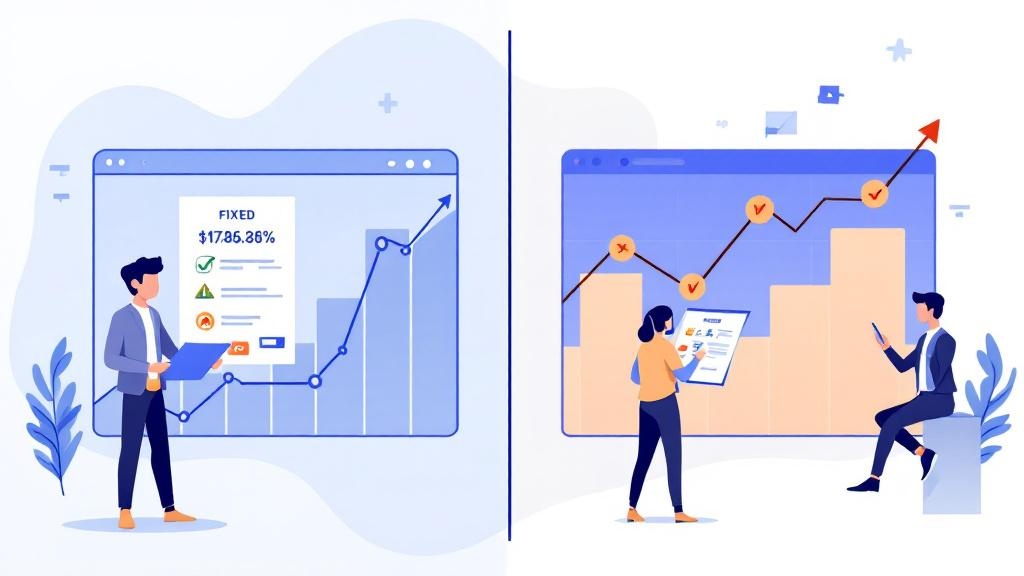When you apply for a loan, one of the most important decisions you’ll need to make is whether to go with a fixed or floating interest rate. Both types of rates come with their own set of advantages and disadvantages, and the right choice largely depends on your financial goals, loan type, and the market conditions. In this article, we’ll break down everything you need to know about fixed vs floating interest rates, so you can make a well-informed decision.
Table of Contents:
-
Introduction: Understanding Fixed vs Floating Interest Rates
-
Fixed Interest Rate: What Is It and How Does It Work?
-
Floating Interest Rate: What Is It and How Does It Work?
-
Fixed vs Floating Interest Rate: Key Differences
-
Pros and Cons of Fixed and Floating Interest Rates
-
How to Choose Between Fixed and Floating Interest Rates
-
Frequently Asked Questions (FAQs)
-
Conclusion: Fixed vs Floating Interest Rate – Which Is Better?
Introduction: Understanding Fixed vs Floating Interest Rates
When you take out a loan, the interest rate directly affects the total amount you will repay. A loan’s interest rate can be classified into two main types: fixed interest rate and floating interest rate (also called variable interest rate). The primary difference between these two is how the rate behaves over time.
-
Fixed interest rates remain the same throughout the loan tenure.
-
Floating interest rates, on the other hand, can change at regular intervals based on market conditions.
But which one is better? Let’s dive deeper into each option.
Fixed Interest Rate: What Is It and How Does It Work?
A fixed interest rate means that the rate of interest you pay on your loan will stay the same throughout the entire loan term, no matter what happens to market conditions or inflation rates.
How It Works
-
When you take out a loan with a fixed interest rate, your EMI (Equated Monthly Installment) remains constant.
-
This gives you a sense of predictability and security, especially for long-term loans like home loans.
Example:
If you take a home loan of ₹50 lakhs for 20 years at a fixed interest rate of 8%, your EMI will stay the same over the course of the loan. Even if interest rates in the market go up or down, your rate will stay fixed.
Advantages of Fixed Interest Rates:
-
Predictability: Your EMI is fixed, so there are no surprises, which helps in budgeting.
-
Protection Against Rate Hikes: Even if interest rates in the market rise, your loan remains unaffected.
-
Peace of Mind: With a fixed rate, you know exactly how much you’ll pay every month.
Disadvantages of Fixed Interest Rates:
-
Higher Initial Rates: Fixed interest rates are often higher than floating rates at the time of taking the loan.
-
Less Flexibility: If market rates go down, you can’t take advantage of the lower rates unless you refinance.
-
Penalty for Early Repayment: Some lenders charge penalties if you want to pay off your loan early.
Floating Interest Rate: What Is It and How Does It Work?
A floating interest rate is linked to a benchmark rate such as the RBI’s repo rate, LIBOR, or other reference rates. This means your interest rate can go up or down over the course of your loan.
How It Works
-
A floating rate loan has an initial interest rate that may change based on market fluctuations.
-
Lenders usually offer floating rates that are lower than fixed rates at the beginning.
Example:
If you take out a loan with a floating rate, it might start at 7.5% but could increase or decrease depending on changes in the benchmark rate or other market factors.
Advantages of Floating Interest Rates:
-
Lower Initial Rates: Floating rates are often lower than fixed rates when you first take the loan.
-
Benefit from Rate Drops: If interest rates decrease, your EMI will decrease too.
-
Flexibility: You can benefit from falling interest rates over time.
Disadvantages of Floating Interest Rates:
-
Uncertainty: You may face fluctuating EMIs, making it harder to plan your monthly expenses.
-
Rate Hikes: If interest rates rise, your EMI will increase, making it difficult to manage your finances.
-
Risk of Higher Payments: Over the life of the loan, market fluctuations could result in paying significantly more than a fixed-rate loan.
Fixed vs Floating Interest Rate: Key Differences
Let’s compare fixed vs floating interest rates in a simple, easy-to-understand way:
| Feature | Fixed Interest Rate | Floating Interest Rate |
|---|---|---|
| Rate Stability | Stays the same for the entire loan term | Varies based on market conditions |
| EMI | Constant throughout the loan tenure | Fluctuates based on interest rate changes |
| Protection | Protected against rate hikes | Vulnerable to market rate increases |
| Initial Rate | Typically higher than floating rate | Lower initial rate compared to fixed |
| Risk | Low risk, predictable payments | Higher risk, fluctuating payments |
| Flexibility | Less flexibility, no rate adjustments | More flexibility, but with potential for higher costs |
| Refinance Options | Requires refinancing for better rates | Can benefit from falling rates without refinancing |
Pros and Cons of Fixed and Floating Interest Rates
Pros of Fixed Interest Rates:
-
No surprises in your monthly payments.
-
Helpful for long-term loans or when you’re on a tight budget.
-
Protection against inflation or economic instability.
Cons of Fixed Interest Rates:
-
Higher initial interest rate.
-
Lack of flexibility to take advantage of rate cuts.
Pros of Floating Interest Rates:
-
Lower starting rates, often cheaper in the beginning.
-
Potential to save money if interest rates fall.
Cons of Floating Interest Rates:
-
Increased unpredictability in monthly payments.
-
Risk of paying more if rates rise in the future.
How to Choose Between Fixed and Floating Interest Rates
Choosing between a fixed vs floating interest rate depends on several factors:
-
Risk Tolerance: If you are okay with the possibility of fluctuating payments and can handle uncertainty, a floating rate might work. However, if you prefer stability, a fixed rate might be a better choice.
-
Loan Term: For long-term loans (e.g., home loans), fixed rates offer the advantage of predictability. For short-term loans, floating rates can be beneficial, especially if you expect rates to fall.
-
Market Conditions: In a high-interest rate environment, a fixed rate might protect you from future rate hikes. On the other hand, if rates are low and expected to stay stable, a floating rate could offer savings.
-
Personal Finances: If you have a tight monthly budget, a fixed rate might be a better option. However, if your income is flexible, you might opt for a floating rate to take advantage of potential rate drops.
Frequently Asked Questions (FAQs)
What is the difference between fixed and floating interest rate?
A fixed interest rate remains the same throughout the loan tenure, while a floating rate can change based on market conditions.
Which is better: fixed or floating interest rate for home loan?
It depends on your risk tolerance and financial situation. A fixed interest rate offers stability, while a floating rate may offer lower initial rates and potential savings if rates decrease.
What are the pros and cons of fixed and floating interest rates?
Fixed rates offer stability but at a higher initial cost, while floating rates are lower initially but come with the risk of fluctuating payments.
Is floating interest rate good in 2025?
If the market is expected to have stable or decreasing interest rates, a floating interest rate could be a good option in 2025. However, if rates are expected to rise, a fixed rate might offer more security.
How do I decide between fixed or floating rate loan?
Consider your financial goals, risk tolerance, and the loan tenure. If you prefer predictability, go for a fixed rate. If you are okay with potential fluctuations and want to save in a low-rate environment, choose a floating rate.








Comments (0)